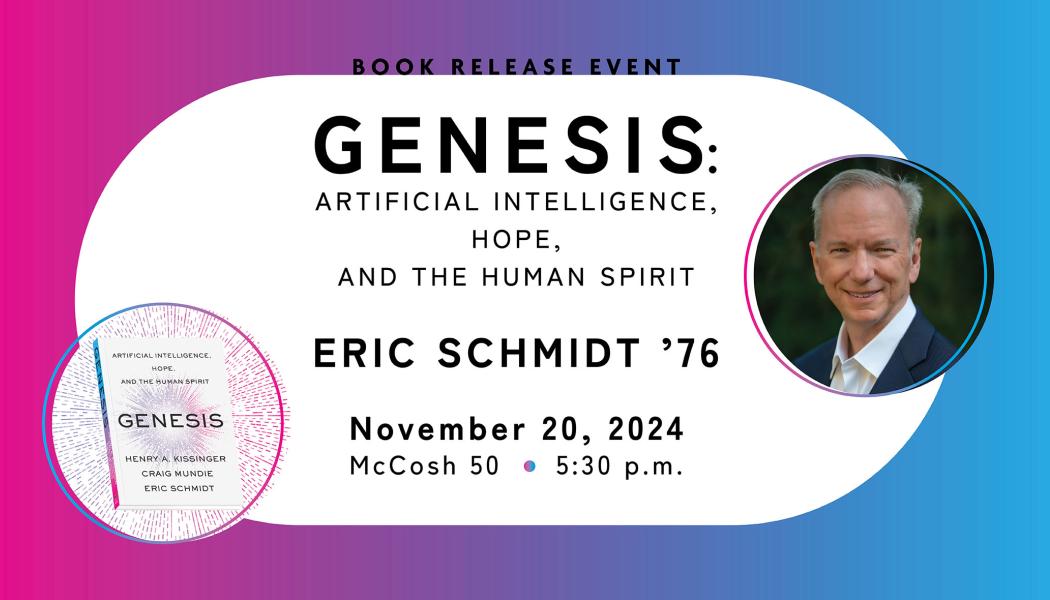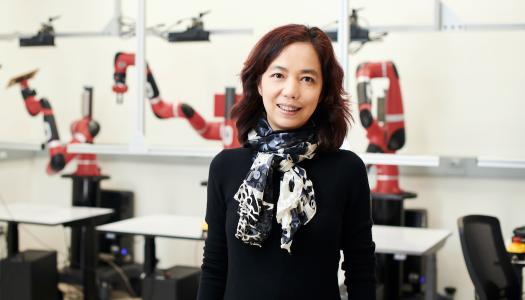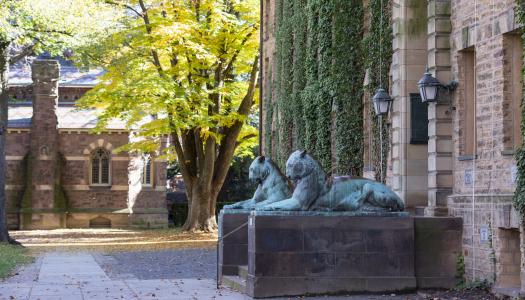
Eric Schmidt ’76, an accomplished technologist, entrepreneur and philanthropist known for his pivotal role as former chairman and chief executive officer of Google, will return to Princeton on Nov. 20 to speak with Provost Jen Rexford ’91 about “Genesis: Artificial Intelligence, Hope, and the Human Spirit,” the new book he co-authored with Craig Mundie and the late Henry Kissinger. The event — at 5:30 p.m. in McCosh Hall, Room 50 — is open to the public, and the first 250 attendees will receive a free copy of the book.
While tickets are sold out for this event, there will be a waiting line for any seats not filled by 5:25 p.m, and the event will be livestreamed on the Princeton University YouTube channel.
Charting a course between blind faith and unjustified fear, “Genesis” was written to help today’s decision-makers seize the opportunities presented by artificial intelligence (AI) without falling prey to the darker forces it can unleash, according to its publisher, Little, Brown and Co. The book advances the urgent conversation surrounding AI with a broad and incisive view of the technology’s potential impact on humanity and the planet.
“Individuals, nations, cultures and faiths … will need to decide whether to allow AI to become an intermediary between humans and reality,” the authors write. They analyze AI’s promise and perils in seven vital areas — discovery, truth, politics, security, prosperity, science and fate — and warn of how quickly change may come. “AI seems to compress human timescales. Objects in the future are closer than they appear.”
Schmidt’s lecture in Princeton is a fitting location for the visionary technologist and alumnus to speak about the issues and opportunities raised by the book. The University is making bold investments in the study and research of artificial intelligence. A Google AI lab opened on Nassau Street in 2019, and the University announced plans last December to establish an artificial intelligence hub for New Jersey in partnership with Gov. Phil Murphy and the New Jersey Economic Development Authority. This fall, Princeton launched its Laboratory for Artificial Intelligence to strengthen its leadership in the field and incorporate interdisciplinary research from across the natural sciences, engineering, social sciences and humanities into AI technology initiatives.
As Google CEO and chairman from 2001 to 2011, Schmidt oversaw the company’s transformation from a small Silicon Valley startup to a global tech giant, alongside founders Sergey Brin and Larry Page. Google dramatically scaled its infrastructure and diversified its products while maintaining a strong culture of innovation. From 2018 to 2020, Schmidt served as technical adviser to Alphabet, the holding company of Google, advising its leaders on technology, business and policy issues. He also was executive chairman of Alphabet from 2015 to 2018 and remained as the chairman of Google until 2015.
Prior to joining Google, Schmidt was chairman and CEO of Novell, a software-as-a-service company. He previously spent 14 years at Sun Microsystems, starting his career as a manager and rising to become chief technology officer. He held technical positions at Xerox Palo Alto Research Center (PARC), Bell Laboratories and Zilog.
In 2017, he and his wife, Wendy Schmidt, established Schmidt Futures, a philanthropic initiative that supports projects at the intersection of talent and technology, centered on specific, finite challenges that are connected to other efforts in the Schmidt philanthropic network. In 2021, he founded the Special Competitive Studies Project, a nonprofit initiative to strengthen America’s long-term competitiveness in AI and technology. Earlier this year, the Schmidts co-founded Schmidt Sciences, a nonprofit organization working to accelerate scientific knowledge and breakthroughs with the most promising, advanced tools to support a thriving planet. He is a co-founder of Innovation Endeavors, an early-stage venture capital firm that invests in companies that are rethinking large industries.
At Princeton, the Schmidts established the Eric and Wendy Schmidt Transformative Technology Fund in 2009, an endowment that supports the invention, development and utilization of cutting-edge technology that has the capacity to transform research in the natural sciences and engineering at Princeton. In 2019, Schmidt Futures established the Schmidt DataX Fund, an interdisciplinary pilot project allowing Princeton researchers to push the limits of data science by leveraging AI and machine learning across the research spectrum. That same year, the Schmidts made a transformative gift to the University that made it possible to rebuild and expand historic Guyot Hall as the new home of the Department of Computer Science; the building has been renamed Eric and Wendy Schmidt Hall and will open in 2029.
In 2019, Schmidt noted that when he earned his undergraduate degree from Princeton in 1976, he majored in electrical engineering “because computer science was barely an option. Now it’s the largest department at Princeton, and data science has the potential to transform every discipline and find solutions to profound societal problems.”
Schmidt has been honored with numerous accolades and supports a variety of esteemed organizations. He was elected to the National Academy of Engineering in 2006 and inducted into the American Academy of Arts and Sciences as a fellow in 2007. He was on the Board of Trustees at Carnegie Mellon University from 2004 to 2006 and at Princeton from 2007 to 2010. Since 2008, he has served as a trustee of the Institute for Advanced Study in Princeton, where after a 12-year tenure he was named an emeritus board member in 2020.
Schmidt was a member of the President’s Council of Advisors on Science from 2009 to 2017. He currently serves as chair of the board of trustees of The Broad Institute, is on the board of The Mayo Clinic and is director of Science for America. Since 2022, he has served as the chairman of the board of directors for Sandbox AQ, which offers AI solutions to challenges in life sciences and other fields. In 2023, he was an Institute of Global Politics Carnegie Distinguished Fellow within Columbia’s School of International and Public Affairs. In 2024, Schmidt was made an honorary Knight of the Most Excellent Order of the British Empire, by King Charles III, for services to Philanthropy.
“Genesis” coauthor Mundie was a Microsoft executive from 1992 to 2014 and has advised Presidents Clinton, Bush and Obama on technology policy. This is the final book co-authored by Kissinger, the former U.S. secretary of state who died in November 2023. Schmidt previously collaborated with Kissinger on the 2021 book, “The Age of AI: And Our Human Future.” They had met at a political conference and became friends, united by what in “Genesis” they call “the urgency of the task ahead.”


